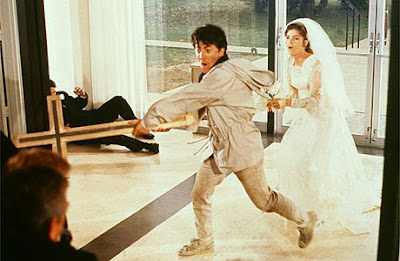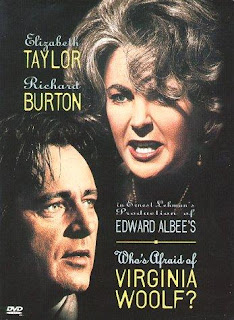IMDB #160 The Graduate
Labels: Anne Bancroft , Buck Henry , Dustin Hoffman , Katherine Ross , Mike Nichols , The Graduate , 0 comments

Are there any movies that make going to college seem like a good idea? So much is made of the post-undergrad malaise there's nearly an entire subgenre, from last year's Tiny Furniture to Noah Baumbach's classic Kicking and Screaming. It even has it's own flops, like Post-Grad.
But 1967's The Graduate might have been the original film to imply that higher education doesn't necessarily elevate your life.
The Key Players:
Our second visit with Mike Nichols, directing his second film. How ridiculous is it that he opened with Who's Afraid Of Virginia Woolf? and The Graduate, back to back?
Dustin Hoffman would launch an iconic career playing oddballs and eccentrics. To this day he remains arguably cinema's most memorable cross-dresser (Tootsie), autistic (Rain Man), male divorcée (Kramer vs. Kramer), and of course Wonder Emporium proprietor.
Anne Bancroft's role as Mrs. Robinson would overshadow her otherwise lauded career, consisting of multiple other nominations and a breakthrough Oscar for The Miracle Worker, in a role she originated on Broadway. Katherine Ross (The Stepford Wives) may look vaguely familiar to my generation since she had a wonderful small part as Donnie Darko's therapist.
Click for More...
The Story:
Benjamin Braddock (Hoffman), a dead-eyed, mystified recent college grad arrives home. His well-to-do parents throw him a party, attended by his parents' uppity bourgeois friends, all of them full of congratulations and vague advice for the future.
Benjamin is beset by worry about said future, but before he can think about it he's seduced by Mrs. Robinson (Bancroft), the wife of his father's business partner- she bullies him into driving her home from the party, strips down and traps him briefly in her bedroom. Though it doesn't take- Benjamin flees downstairs, and makes a hasty, flopsweat-filled exit after sharing an awkward drink with the just returned Mr. Robinson- he soon calls her up to start a wordless, summer long affair at a hotel.
Even the most basic attempts at small talk with Mrs. Robinson fail, though she does talk at length about one thing: she forbids him from seeing her daughter, Elaine (Ross). So naturally Benjamin falls in love with her.
Even after it's all out in the open, Benjamin feels himself drawn to the younger Robinson woman, so he announces his intention to marry Elaine to his parents, and follows her on a fool's quest to Berkeley.
The Artistry:
Much like Bonnie & Clyde, The Graduate spoke to a large audience on the cusp of a revolution. And while I couldn't really fathom why so many disillusioned youth would latch on to Beatty and Dunaway's stylish but empty posturing as a cultural moment, I can see why Hoffman's blank cipher, unmoored and aimless holds a wide appeal.
It might help that I'm pretty much stuck in the exact same period of post-college self-evaluation- thanks, English degree!
The Graduate is about life happening around you- Hoffman is moved through the opening credits on an airport walkway, standing stone-still himself. He stumbles through the party of faceless corporate well-wishers (the on-the-nose pro-tip of "plastics" is probably the movie's most famous quote), is jostled into position by Mrs. Robinson, and hides from his family in a deep-sea diver suit.
Anything he actually does, later in the film, is met with resistance and unexplained hostility by the older generation, especially Mrs. Robinson. Her downright animosity at the idea of Benjamin and Elaine together is never explained (other than that it would just be, you know, messed up).
Even after gamely trying to put Elaine off entirely (driving like a maniac, taking her to a strip club), Benjamin finds it easy to open up to Elaine, to be himself, perhaps. But it's hard to tell if that's something he found worth pursuing so stridently on his own, or because it was forbidden.
Adding to the hip factor, in an era before so-called "music televison," is the function of The Graduate as an extended music video for a handful of Simon & Garfunkel songs. The thematically relevant "Sounds of Silence" bookends the film, "April Come She Will" is wonderfully edited with the beginning of Benjamin's laconic summer, "Scarborough Fair/Canticle" plays for what seems like ten minutes when he goes to Berkeley, and the original(ish) song "Mrs. Robinson" briefly scores the big finish- Simon would write a full version for a later album, which became the ubiquitous radio staple we all know.
The wistful, melancholy folksiness of said tunes adds much more emotional weight than the screenplay seems to have in mind, filling in the spaces that Calder Willingham and Buck Henry's screenplay leaves empty. The performances, especially Hoffman's mumbling blankness and Bancroft's arch hostility, seem like caricatures in memory but are very restrained on the whole. No one in The Graduate seems to know what they're doing, or why they're doing it, but Hoffman and Ross are the heroes of the story because they're willing to admit it.
THE ENDING! SPOILERS!
Their seeming rebellion manifests itself in a somewhat shocking showdown at a church- Elaine's family spirits her off to marry a patented Some Douchebag, and Benjamin's manic drive to stop the wedding and pounding on the chapel window are the stuff of cinema legend.
What I always think of though, is the rapidly cut faces of Mr. and Mrs. Robinson (and Some Douchebag), whose faces are absolutely convulsing with rage when they realize what's happening, and the way Benjamin has to hold them all off by swinging a cross ripped from the wall.
As they sit on a bus, riding off into the proverbial sunset, Benjamin's trademark neutral expression creeps back onto his face, and quickly spreads to Elaine's as well. What do they do now?
END SPOILERS
Overall: Should It Be Higher, Lower?
I guess I'm going with an obligatory higher- The Graduate makes me mildly uncomfortable every time I see it, but I seem to watch it every few years one way or another. It might be this time the post-collegiate malaise hits a little close to home, but it's one of those films that feels like a classic, even when you're watching it.
The Legacy:
Aesthetically, The Graduate is bright and arresting, and surely that's inspired the Wes Andersons of the world (as has the interwoven pop music, much like the use of Cat Stevens in Harold and Maude).
The cinematographer, producer, screenwriters, and all three principal stars would be Oscar-nominated for their work, but the sole statue went to Nichols as director (still his only one out of five trips). And while sure, I'd agree to throw in the NFR archives, I don't know if it needs to be AFI's seventh greatest film of ALL TIME.
The Best Video Of It On YouTube:
Kind of tough. The ending? The initial seduction? Plastics? I'm going with the run-up to Benjamin and Mrs. Robinson's awkwardly hilarious first meeting at the Taft Hotel bar- "Are you here for an affair sir?"
Leftover Thoughts:
-Simon & Garfunkel, too busy to write any original songs in earnest for the film, just contributed a bunch of old stuff and and re purposed a vague, nostalgic song about Americana and "Mrs. Roosevelt." Lazy jerks.
-I saw the parody of the ending in Wayne's World 2 waay before I saw The Graduate itself.
Coming Up...
159. Groundhog Day
158. The Bourne Ultimatum
157. The Big Sleep
 RSS Feed
RSS Feed






